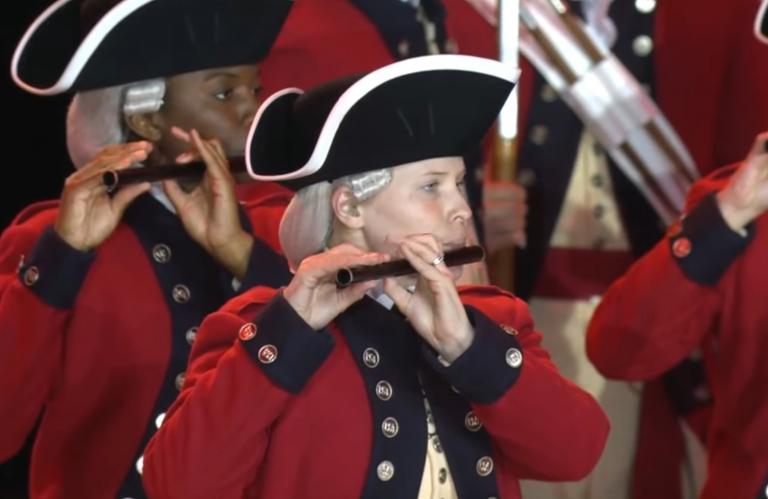
Rogers returns to Nebraska with Army's Old Fife and Drum Corps
calendar icon23 May 2022
Lincoln, Neb.--Staff Sergeant Katie Rice Rogers (M.M. 2017) is a fife instrumentalist with the Army's Old Guard Fife and Drum Corps stationed at Ft. Myer in Arlington, Virginia. A small team from her unit will be performing in Omaha May 26-28 as part of the patriotic events for Memorial Day weekend.
They will perform at the Balloon Glow at Memorial Park on May 27 at 7 p.m. (https://go.unl.edu/5z9g). They will also participate in the Patriotic Parade and Concert in Omaha's Old Market on May 28 (https://go.unl.edu/u7vr).
The Hixson-Lied College of Fine and Performing Arts caught up with Rogers ahead of her Nebraska performances this week to learn more about her career as a military musician.
What made you decide to pursue a military performance career?
I grew up close to Washington, D.C., so I knew a little about military bands growing up—many of the private lesson teachers, marching band clinicians and performers in the area were either current or retired military musicians. Once I finished school, I started applying and auditioning for jobs close to home, and I realized there are a lot more performance opportunities in the D.C. area through the military than any other employer of musicians. I have always enjoyed playing band music and piccolo, so I made the military bands of D.C. my goal.
What is it like being a fife instrumentalist with the Army’s Old Guard Fife and Drum Corps?
Being a fife instrumentalist involves a lot of marching and the ability to perform primarily from memory. The Corps performs all ceremonies, parades and shows completely memorized and at a high level of precision. This comes with a lot of daily practice individually, with the fife group, and as a full corps to ensure we are always ready for any mission we are tasked with.
What do you love the most about it?
I love that I get to perform in a lot of unique locations and for a wide variety of audiences that I wouldn’t have the opportunity to play for otherwise.
What’s the most challenging?
The most challenging aspect is that we are active duty soldiers and at the end of the day being a soldier comes first, even when that means taking on tasks that are difficult or nonmusical.
Where are some of the places/events you have been able to perform at?
Our unit has played in every Inauguration since President Kennedy's in 1961. So far, I’ve been sent to Colorado, Texas, Connecticut, South Carolina, Pennsylvania, Maryland, Washington, D.C., and various locations in Virginia to play for sporting events, festivals, schools, parades, and ceremonies. The most unexpected audience I’ve played for so far was a few WWE RAW wrestlers visiting our base for a USO event!
How did your time at UNL help prepare you for this?
My time in the UNL Flute and Theory studios helped me to become more confident in myself as a musician and also have the courage to explore and create opportunities for myself. If there was an audition or area of interest I wanted to pursue, I always had support from my professors and the other students around me. This included staying for an extra year to complete the requirements for the MM in Music Theory degree in addition to the Flute Performance degree I was in the process of completing. Coming from a university that encourages students to explore their own path gave me the confidence to veer from the traditional orchestral performer or academic teaching tracks and feel comfortable finding my own way to a fulfilling career.
What is your lasting memory of your time in the Glenn Korff School of Music?
Many of my favorite memories are from my flute lessons with Dr. John Bailey and theory classes with Dr. Stanley Kleppinger. Both professors encouraged me so much while I was their student and brought joy to the study of music while challenging me to become a stronger musician.
What advice would you give to students who might be interested in a military performing career?
Anyone interested in a military performing career should be someone who is determined and flexible. It is a very rewarding career, but it takes a lot of work to become a military musician. Along with a high level of musicianship, aspiring military musicians must also meet and maintain the qualifications for the branch of service they plan to enter. In the military, tasks are always changing and you have to be ready for whatever comes your way–sometimes those tasks end up being the most interesting things you do on the job.
Any final thoughts?
If anyone reading this sees the Army Old Guard Fife and Drum Corps perform, come say hi. We enjoy talking with our audience members, answering questions, and taking photographs!